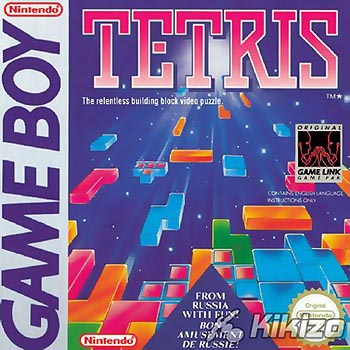Interview: Tetris - The Making of an Icon
We interview two game prodigies, Alexey Pajitnov & Henk Rogers, whose fascinating story behind Tetris goes right to the top of NCL - with plenty of twists along the way.
Page 2
Alexey Pajitnov Interview
Kikizo: You grew up in Moscow, right?
Pajitnov: Yes, yes. It's my motherland you have to understand, I like it here.
Kikizo: Well, could you tell us a little bit more about that? About what you did and the schools you went to, the education you got before everything started, mid-'80s
Pajitnov: Well, there's nothing special about my life. I was just a normal Moscow schoolboy. And then I graduated high school and went to a local institute. It's like a university - it was a technical university. It is called Moscow Institute of Aviation, I graduated from it in 1979 and started working for the Moscow Academy of Sciences, in the computer centre. I worked in computer science research, writing some programs for the computers there. All my life, I liked to play games, and I started programming games. At one point, working at my computer, I wrote the code for a game called Tetris. That's the true story.
Kikizo: Did you write anything else before that? Any other games?
 Pajitnov: Well, yes. I wrote several games, several puzzles, and Tetris was just one of them. The other puzzles weren't very interesting. I published some later.
Pajitnov: Well, yes. I wrote several games, several puzzles, and Tetris was just one of them. The other puzzles weren't very interesting. I published some later.
Kikizo: Were you pretty much free to do what you wanted in your research, or were you really restricted?
Pajitnov: Basically, I had my own working plan, and I had some work to do. All the games and puzzles were done in spare time. I had enough freedom, actually, because basically we spent very long hours in our job places, and we were able to do all our work. And we had extra time to use the computers.
Kikizo: The computers, what kind of computers were those?
Pajitnov: At that time I worked with lots of different computers from different countries, with different processors. I did work in the lab, which was full of all kinds of different stuff, and there I wrote whole programs for different kinds of hardware. In particular we did work with our first personal computer. That was still the era of mainframe computers. Big stuff on the whole. But at some point we got the very first load of personal computers, which stayed on my desk. I was very excited about that.
Kikizo: And Tetris was made on an Elektronika 60 computer?
Pajitnov: Yes, that's what I'm talking about. It was small. It was a type of desktop computer. Well, basically, it had 64KB memory, and [laughs] it had just an alphanumeric screen, so it was kind of strange.
Kikizo: Did you have access to Western computers like the ZX Spectrum or Commodore 64? Those were things that were up-and-coming in the US and Europe back then. Or an MSX?
Pajitnov: Well, we had the MSX a bit later, maybe four or five years after that. At that time we had some of the very first PCs in the computer center. We had several business-type PCs. I think they were Japanese PCs. But I did follow them. Me personally, I didn't have them. So I worked with the other hardware.
Kikizo: Did you have access to the work being done in the West, or were you mostly shielded from that?
Pajitnov: I saw the computers, and most of the games I saw on PCs were - well, at that time it wasn't very big. But I saw Pac-Man, I saw Q-bert and a few other games like that.
Kikizo: It's funny you should mention Pac-Man because from what I understand the creator of Pac-Man [Toru Iwatani] was in the same situation you were. He was being paid a salary, he made a game that was really, really big all over the world, and he didn't even get a bonus for it.
 Pajitnov: I think that was the typical situation. Pac-Man was a great game. I think it was quite a big achievement. Actually, I had a friend with Pac-Man, and he was playing it over and over again and he started writing his own version. I didn't understand why he was doing that at all so I asked him and he said: "When I play this game, I feel like some sort of alien intellect plays this game with me. I can't believe that this is all random so I wanted to write it myself to understand how it works." [Laughs]
Pajitnov: I think that was the typical situation. Pac-Man was a great game. I think it was quite a big achievement. Actually, I had a friend with Pac-Man, and he was playing it over and over again and he started writing his own version. I didn't understand why he was doing that at all so I asked him and he said: "When I play this game, I feel like some sort of alien intellect plays this game with me. I can't believe that this is all random so I wanted to write it myself to understand how it works." [Laughs]
Kikizo: That's a great story! So then Tetris came along. It took a few years before it became really big; for the first few years it just spread throughout Moscow, to other communist countries, and then it spread to the West. Did you have any knowledge of the way it was growing?
Pajitnov: Not exactly, because the way the software was distributed was just the coding and copying. You'd write a program for a friend, and within a couple days you'd see it everywhere. So basically, there was no way to track it. That was the way things happened back then, but I can probably say it spread much quicker than two years. As soon as I finished it my first version was on the Elektronika 60. It was just a Russian computer. And when I released that version, meaning when I gave the code to my friends, in a few weeks I saw it in every place that had a Elektronika 60. And then I realized that the game was not bad and people found it interesting. So I converted it for PC, in 1985, so we could make it look pretty. And afterwards we decided to go ahead and put the PC version out there and it spread out really quickly. It was a question of just a couple of months.
Kikizo: But it did take a couple of years for a deal to be made to get it distributed in the West.
Pajitnov: Yes, all the licensing was another story. That was a long time ago.
Kikizo: Well, the licensing was an entirely different story, apparently, because there were a lot of troubles, with a lot of companies thinking they had the license. Were you aware of what was going on there? Were you involved?
Pajitnov: Yeah I was involved. They kept me involved with that. It was lots of trouble. But lots of words have been written about the licensing troubles and everything that went wrong there and I don't really like to talk about that because when I think about those things I lose my sense of humour.








 Satoru Iwata Video Interview - the late Nintendo president spoke with Kikizo in 2004 as 'Nintendo Revolution' loomed.
Satoru Iwata Video Interview - the late Nintendo president spoke with Kikizo in 2004 as 'Nintendo Revolution' loomed. Kaz Hirai Video Interview - the first of Kikizo's interviews with the man who went on to become global head of Sony.
Kaz Hirai Video Interview - the first of Kikizo's interviews with the man who went on to become global head of Sony. Ed Fries Video Interview - one of Xbox's founders discusses an epic journey from Excel to Xbox.
Ed Fries Video Interview - one of Xbox's founders discusses an epic journey from Excel to Xbox. Yu Suzuki, the Kikizo Interview - we spend time with one of gaming's most revered creators.
Yu Suzuki, the Kikizo Interview - we spend time with one of gaming's most revered creators. Tetris - The Making of an Icon: Alexey Pajitnov and Henk Rogers reveal the fascinating story behind Tetris
Tetris - The Making of an Icon: Alexey Pajitnov and Henk Rogers reveal the fascinating story behind Tetris Rare founders, Chris and Tim Stamper - their only interview? Genuinely 'rare' sit down with founders of the legendary studio.
Rare founders, Chris and Tim Stamper - their only interview? Genuinely 'rare' sit down with founders of the legendary studio. The History of First-Person Shooters - a retrospective, from Maze War to Modern Warfare
The History of First-Person Shooters - a retrospective, from Maze War to Modern Warfare